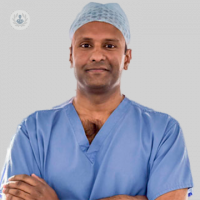Female urinary incontinence over time: a wee guide
Written in association with:Little accidents happen to everyone. Urinary incontinence is surprisingly common at all stages of life, ranging from small leakages to bigger accidents. While some people accept it, believing it is simply a part of getting older, often there is something that can be done. Experienced urologist Mr Nikesh Thiruchelvam is here to explain how your bladder changes as you age and when you should see a doctor about incontinence.

What happens to your bladder as you age?
Urinary incontinence rates certainly vary over time. When you are born, you leak urine as soon as your bladder is full. You then learn social continence (potty training) when you pass urine when it is convenient or on demand. It may take slightly longer to get dry at night with bedwetting (or enuresis) present in 5-10% of 7 year olds and 1-2% of 12 year olds. Around 5-10% of women will experience urinary incontinence in their 20s and 30s. The prevalence of urinary incontinence then increases to around 30% in middle aged women and then up to 60% of older women.
Check out these bedwetting solutions for children
How easy is it to notice change over time?
There are two main types of urinary incontinence.
Stress urinary incontinence refers to leaking urine with activity and is common after childbirth. It is thought that around 1 in 3 women will having ongoing, problematic stress urinary incontinence. How much this bothers an individual will partly depend on how active they are and how much urine they may leak. Some women find they curtail activities they may enjoy because of their leakage.
More bothersome to women and more prevalent is urge urinary incontinence. This is the type of leakage that occurs when you suddenly feel you need to pee and can’t get to the toilet in time. This maybe a small squirt leaving a damp patch on your underwear or a full flood, soaking your clothes. This type of leakage becomes more common with age.
It is also possible to suffer from both stress and urge urinary incontinence (mixed urinary incontinence).
Is incontinence a normal part of ageing?
No, although many people think it is and therefore simply put up with it. Stress urinary incontinence may persist after childbirth and some women just learn to live with it even when it can be treatable. Urge urinary incontinence is usually very bothersome and can stop people from working, travelling or socialising. This is also treatable and patients should seek help rather than feel it is a normal part of getting older.
There are some associated risk factors, which may be treatable, and may also cause urinary leakage. Pregnancy, labour and vaginal delivery can cause incontinence, as can HRT. Diabetes, urinary tract infection and cognitive impairment, such as with dementia, is linked with incontinence.
When should I go to see a doctor?
You should see a doctor if you leak urine and have any associated ‘red flags’ such as a urinary tract infection, blood in the pee or abdominal or pelvic pain. Even without these red flags, it is worth seeing a urologist to discuss ways to treat your urinary leakage.
There may be simple options to improve the leakage such as changing your diet or fluid intake, physiotherapy and bladder retraining. There are also medications that can be very helpful and finally, surgery may be used to treat bothersome urinary incontinence. This may involve discussing options of anti-stress urinary incontinence surgery or botox or sacral nerve stimulation for urge urinary incontinence.


